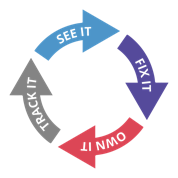Reinforcing Democracy with Real Election Reform
If Tomorrow Matters, We Need Fair and Reliable Elections
This newsletter introduces a few essays on issues impacting the integrity, fairness and competitiveness of America’s elections. This series will address gerrymandering, voter registration, voter access, voting methods, election administration and post-election audits. Our goal is to present pragmatic ideas for restoring public faith in the electoral systems upon which the future of American democracy depends.
Big Story
Since the 2020 election, we have heard about the Big Steal and Big Lie. What’s really behind these headlines?
For the first time in our history, an incumbent President tried to overturn an election he lost. Refusing to accept defeat, the now ex-President has unleashed his allies on American democracy itself. In the name of electoral integrity, some politicians are leading or calling for “audits” of election results long such certified. The Maricopa County effort is more hit job than audit, carried out by a firm selected on a no-bid basis for its association with conspiracy theories rather than relevant qualifications.
Big Question
What is really behind the Big Lie, the Maricopa County ninja audit and other attacks on certified elections? Is the campaign about overturning prior elections or dictating the results of future elections?
The Maricopa County hatchet job may not be the last of its kind. Similar efforts have been proposed in other states. As the delays continue, costs rise and unanswered questions mount, we cannot help but wonder if this will be a permanent feature of American elections and, if so, a grave threat to democracy.
What is the end game? Overturning an old election? Ensuring the integrity of future elections? Undermining confidence in all elections? Preparing the American people for partisan interference in future elections? Once we decide that only winning matters, we can justify just about anything. Gerrymandering. Registration red tape. Voting restrictions. Fewer polling places and longer waits. Voter harassment. Local interference. If there are no consequences, we can do anything.
Big Idea
A thoughtful, nonpartisan effort to reform our elections, strengthen our democracy and enhance public faith in our civic institutions.
Senator Manchin of West Virginia argues that reforming our elections is too important to be done on a partisan basis. Setting aside the filibuster issue, he makes a strong case. While recent efforts to change election laws have been largely partisan (e.g., Democratic bills in DC and GOP bills in Georgia and Texas), enacting partisan election reforms will not likely give us the broad consensus we need to restore public confidence.
If we cherish democracy, we must make our elections more competitive, representative and reliable. We must reconcile the potentially competing goals of voter access and election integrity. We must ensure that our elections reflect the will of the people.
How? By moving from partisan to nonpartisan. By reducing the influence of political operatives in conducting elections. Independent redistricting. Streamlined voter registration. Convenient voting systems. Rigorous, yet efficient controls. Professional election administration. Independent audits.
Promising Initiatives
Iowa – the nonpartisan Legislative Services Agency draws maps that equalize population, honor political subdivisions, promote contiguous, compact districts, avoid favoring any political party or incumbent and exclude political data (e.g., voter party affiliation and previous election returns)
West Virginia – in 2016 with broad bipartisan support, became third state to enact automatic voter registration (eligible citizens automatically registered to vote upon securing driver’s license (unless they opt out)
Utah—used universal mail-in voting since 2012 with minimal fraud or other problems and improving voter turnout and education (Governor Spencer Cox has referred to the system as an unqualified success)
Alaska – In 2020, voters narrowly approved Ballot Measure 2 for federal and state candidates replacing party primaries with a single nonpartisan primary, advancing the top four candidates to the general election and requiring the use of ranked-choice voting (RCV) for general elections
Other Views
Why Republicans Are Moving To Fix Elections That Weren't Broken, Steve Inskeep, Morning Edition, NPR February 28, 2021
Congress Must Pass the ‘For the People Act’, Brennan Center for Justice, January 29, 2021
Redistricting Systems: A 50-State Overview, National Conference of State Legislatures, March 29, 2021
State Lawmakers Begin Once-a-Decade Redistricting Fight, Pew Charitable Trusts, Stateline, January 29, 2021
How does vote-by-mail work and does it increase election fraud?, Brookings Institution June 22, 2020
Ranked-Choice Voting Is Bad for Everyone, Harvey Mansfield, Wall Street Journal, July 7, 2021
An Idea for Electoral College Reform That Both Parties Might Actually Like, Edward Foley, Ohio State University, Politico Magazine, January 12, 2019
The Case for Proportional Voting, Lee Drutman, National Affairs, Summer 2021
The Facts About Election Integrity and the Need for States to Fix Their Election Systems, February 1, 2021 Heritage Foundation
Civic Way System
The Civic Way system for improving state and local governance helps leaders see civic problems, fix those problems, own the solutions and track civic progress. Civic Way’s proven best practices and advisors can help state and local leaders apply this approach to their institutions. Check out Civic Way’s sample tools.






